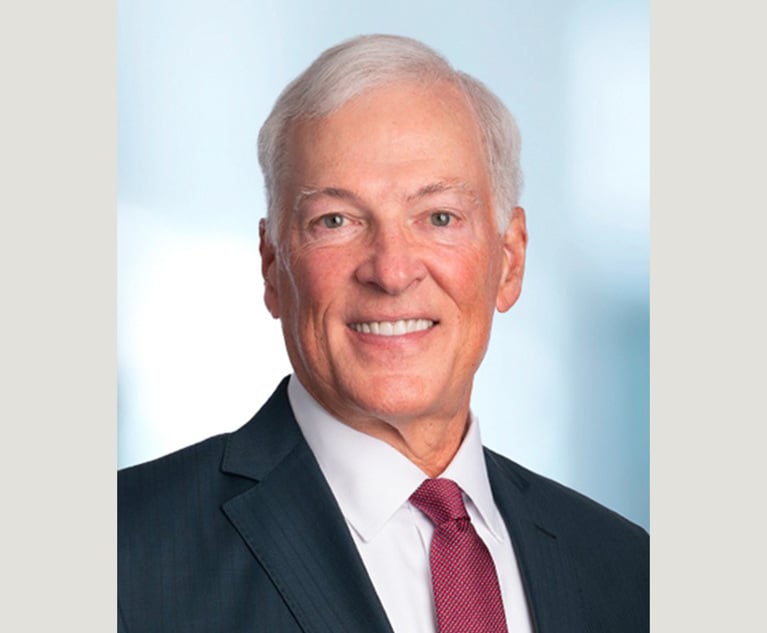Persons Who Drive for Uber After Job Loss May Still Get Unemployment Benefits, Court Rules
Out-of-work Pennsylvanians who drive for a ride-hailing service in their spare time are not automatically ineligible for unemployment benefits, a Pennsylvania appellate court has ruled.
January 24, 2018 at 04:25 PM
3 minute read
 Uber car. Photo: Jason Doiy/ALM
Uber car. Photo: Jason Doiy/ALM
Out-of-work Pennsylvanians who drive for a ride-hailing service in their spare time are not automatically ineligible for unemployment benefits, a Pennsylvania appellate court has ruled.
An en banc panel of the Commonwealth Court ruled 7-1 Wednesday that a former behavioral health specialist should be entitled to unemployment benefits, despite earning money as a driver for Uber after he lost his job. The decision reversed a holding from the Unemployment Compensation Board of Review.
The UCBR had determined that the driver, Donald Lowman, could not receive the benefits because driving for Uber constituted “self-employment.”
The court said that Lowman's earnings could defray the amount of benefit received but were not a disqualifier. The ruling comes on an apparent matter of first impression and deals with one way the gig economy intersects with traditional economic benefits.
President Judge Mary Hannah Leavitt, however, said the board's reasoning was flawed, and there was no indication that he planned to enter into an independent business venture as an Uber driver.
A side job, Leavitt indicated, was a side job, even if entered into after loss of full-time work.
“Uber permitted claimant to drive for other ridesharing entities, and claimant was able to accept or refuse assignments. These findings, which focused solely on claimant's relationship with Uber, do not reflect 'a positive step' toward establishment of an independent business,” Leavitt said. “Simply, his actions did not reflect 'an entrepreneurial spirit' or 'intentions of starting a new business or trade.'”
Although the court remanded the case back to the unemployment compensation referee to calculate Lowman's unemployment benefits, Leavitt noted that the amount of his earnings as an Uber driver will need to be factored in to offset what he receives in benefits.
Judge Patricia McCullough issued a concurring and dissenting opinion, saying she disagreed with the majority's rationale, but agreed with its holding.
According to Leavitt, Lowman worked as a behavioral health specialist, but lost his job and applied for unemployment compensation benefits in June 2015. While he was awaiting a determination he entered into a software license and online service agreement with Uber's parent company, and began working as an Uber driver in July 2015.
About a month later the Unemployment Compensation Service Center determined that Lowman was not entitled to benefits, finding that his agreement with Uber made him ineligible.
Focusing on the degree of dependence between Lowman and Uber, the review board also determined that Lowman was ineligible for the benefits. The board found that he was not a subordinate in the company, and could refuse assignments if he wanted, or could provide similar services for other companies.
Leavitt, however, said that analysis “misses the mark.”
“The question here is whether claimant took a positive step to embark on an independent trade or business, thereby disqualifying himself for benefits,” Leavitt said.
Julia Simon-Mishel of Philadelphia Legal Assistance represented Lowman, Janet Tarczy represented the review board and Paul Lantis of Littler Mendelson represented Uber. Philadelphia Legal Assistance, a spokeswoman for the Department of Labor and Industry and Lantis each did not return a call seeking comment.
This content has been archived. It is available through our partners, LexisNexis® and Bloomberg Law.
To view this content, please continue to their sites.
Not a Lexis Subscriber?
Subscribe Now
Not a Bloomberg Law Subscriber?
Subscribe Now
NOT FOR REPRINT
© 2025 ALM Global, LLC, All Rights Reserved. Request academic re-use from www.copyright.com. All other uses, submit a request to [email protected]. For more information visit Asset & Logo Licensing.
You Might Like
View All
Superior Court Directs Western Pa. Judge to Recuse From Case Over Business Ties to Defendant
3 minute read

Kline & Specter and Bosworth Resolve Post-Settlement Fighting Ahead of Courtroom Showdown
6 minute read
Saxton & Stump Lands Newly Retired Ex-Chief Judge From Middle District of Pa.
3 minute readTrending Stories
- 1Silk Road Founder Ross Ulbricht Has New York Sentence Pardoned by Trump
- 2Settlement Allows Spouses of U.S. Citizens to Reopen Removal Proceedings
- 3CFPB Resolves Flurry of Enforcement Actions in Biden's Final Week
- 4Judge Orders SoCal Edison to Preserve Evidence Relating to Los Angeles Wildfires
- 5Legal Community Luminaries Honored at New York State Bar Association’s Annual Meeting
Who Got The Work
J. Brugh Lower of Gibbons has entered an appearance for industrial equipment supplier Devco Corporation in a pending trademark infringement lawsuit. The suit, accusing the defendant of selling knock-off Graco products, was filed Dec. 18 in New Jersey District Court by Rivkin Radler on behalf of Graco Inc. and Graco Minnesota. The case, assigned to U.S. District Judge Zahid N. Quraishi, is 3:24-cv-11294, Graco Inc. et al v. Devco Corporation.
Who Got The Work
Rebecca Maller-Stein and Kent A. Yalowitz of Arnold & Porter Kaye Scholer have entered their appearances for Hanaco Venture Capital and its executives, Lior Prosor and David Frankel, in a pending securities lawsuit. The action, filed on Dec. 24 in New York Southern District Court by Zell, Aron & Co. on behalf of Goldeneye Advisors, accuses the defendants of negligently and fraudulently managing the plaintiff's $1 million investment. The case, assigned to U.S. District Judge Vernon S. Broderick, is 1:24-cv-09918, Goldeneye Advisors, LLC v. Hanaco Venture Capital, Ltd. et al.
Who Got The Work
Attorneys from A&O Shearman has stepped in as defense counsel for Toronto-Dominion Bank and other defendants in a pending securities class action. The suit, filed Dec. 11 in New York Southern District Court by Bleichmar Fonti & Auld, accuses the defendants of concealing the bank's 'pervasive' deficiencies in regards to its compliance with the Bank Secrecy Act and the quality of its anti-money laundering controls. The case, assigned to U.S. District Judge Arun Subramanian, is 1:24-cv-09445, Gonzalez v. The Toronto-Dominion Bank et al.
Who Got The Work
Crown Castle International, a Pennsylvania company providing shared communications infrastructure, has turned to Luke D. Wolf of Gordon Rees Scully Mansukhani to fend off a pending breach-of-contract lawsuit. The court action, filed Nov. 25 in Michigan Eastern District Court by Hooper Hathaway PC on behalf of The Town Residences LLC, accuses Crown Castle of failing to transfer approximately $30,000 in utility payments from T-Mobile in breach of a roof-top lease and assignment agreement. The case, assigned to U.S. District Judge Susan K. Declercq, is 2:24-cv-13131, The Town Residences LLC v. T-Mobile US, Inc. et al.
Who Got The Work
Wilfred P. Coronato and Daniel M. Schwartz of McCarter & English have stepped in as defense counsel to Electrolux Home Products Inc. in a pending product liability lawsuit. The court action, filed Nov. 26 in New York Eastern District Court by Poulos Lopiccolo PC and Nagel Rice LLP on behalf of David Stern, alleges that the defendant's refrigerators’ drawers and shelving repeatedly break and fall apart within months after purchase. The case, assigned to U.S. District Judge Joan M. Azrack, is 2:24-cv-08204, Stern v. Electrolux Home Products, Inc.
Featured Firms
Law Offices of Gary Martin Hays & Associates, P.C.
(470) 294-1674
Law Offices of Mark E. Salomone
(857) 444-6468
Smith & Hassler
(713) 739-1250





